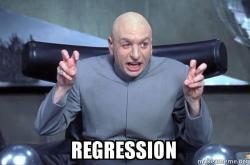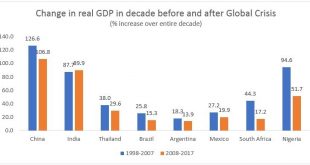A well-known criticism of national income is thre ‘Ïf you marry your maid you will diminish national income‘ mrmr. Sigh. We should forget about this silly male fantasy and give women their due by replacing it by what really happened. Domestic workers did not marry their single masters. They left them, as they had better paying things to do. Or the income of their family rose, which enabled them to get an education or to care for their own kids. Unprotected labor by Vanessa May is a good...
Read More »What’s the use of economics?
from Lars Syll The simple question that was raised during a recent conference … was to what extent has – or should – the teaching of economics be modified in the light of the current economic crisis? The simple answer is that the economics profession is unlikely to change. Why would economists be willing to give up much of their human capital, painstakingly nurtured for over two centuries? For macroeconomists in particular, the reaction has been to suggest that modifications of existing...
Read More »Regression analysis — a case of wishful thinking
from Lars Syll The impossibility of proper specification is true generally in regression analyses across the social sciences, whether we are looking at the factors affecting occupational status, voting behavior, etc. The problem is that as implied by the conditions for regression analyses to yield accurate, unbiased estimates, you need to investigate a phenomenon that has underlying mathematical regularities – and, moreover, you need to know what they are. Neither seems true. I have no...
Read More »Radical paradigm shifts
from Asad Zaman The methodology and ideology of modern economics are built into the frameworks of educational methods, and absorbed by students without any explicit discussion. In particular, the logical positivist philosophy is a deadly poison which I ingested during my Ph.D. training at the Economics Dept in Stanford in the late 1970s. It took me years and years to undo these effects. Positivism uses clever arguments to make you deny what you feel in your bones to be true, and make you...
Read More »Did developing countries really recover from the Global Crisis?
from C. P. Chandrasekhar and Jayati Ghosh We are nearing the tenth anniversary of the collapse of Lehman Brothers in the United States that sparked a Global Financial Crisis,affecting every economy in significant ways. That crisis generated extraordinary monetary policy responses in the advanced economies, with low interest rates and unprecedented expansion of liquidity, in an effort largely driven by central banks to keep their economies afloat. By contrast, expansionary fiscal policy...
Read More »The main reason why almost all econometric models are wrong
from Lars Syll How come that econometrics and statistical regression analyses still have not taken us very far in discovering, understanding, or explaining causation in socio-economic contexts? That is the question yours truly has tried to answer in an article published in the latest issue of World Economic Association Commentaries: The processes that generate socio-economic data in the real world cannot just be assumed to always be adequately captured by a probability measure. And, so,...
Read More »Corporations and mainstream media trumpet the “horrors” of higher wages
from Dean Baker The media have treated us to an array of stories warning us of the terrible labor shortage facing the country. Some of the pieces have been general, such as this CNBC piece on the labor shortage “reaching a critical point,” or this Wall Street Journal article on wage gains “threatening profits.” Others have been more industry-specific, such as The Washington Post’s highlighting of the trucker shortage that threatens the “prosperous economy.” Then there is this New York...
Read More »Hard and soft science — a flawed dichotomy
from Lars Syll The distinctions between hard and soft sciences are part of our culture … But the important distinction is really not between the hard and the soft sciences. Rather, it is between the hard and the easy sciences. Easy-to-do science is what those in physics, chemistry, geology, and some other fields do. Hard-to-do science is what the social scientists do and, in particular, it is what we educational researchers do. In my estimation, we have the hardest-to-do science of them...
Read More »Dean Baker – Give Me The Power – Copyright 2018
IG: DEANRAVENBAKER Music / Artist / Vocals: Dean Raven Baker Song: Give Me the Power "Creation of sound through the evocation of the true self". - Dean Baker. This original song was first recorded around the year 2010 on my laptop and sat in the vault for almost 8 years along with a dozen other albums worth of content after the group disbanded. After long contemplation I've decided to pull it out, add some visuals (big thanks to Pixabay & Videvo for the video clips) and share it with...
Read More »Shifting attention: two ideas for a genuine micro founded macro-economic master thesis
from Merijn Knibbe I’m trying to write a book about the relation (not) of neoclassical macro-economic concepts to the concepts of macro-economic statistics. Which leads one to interesting places one can’t explore. If there is anybody out there in search for an interesting idea for a master thesis or something light that, these might do: A qualitative and quantitative exploration of ‘hoboism’ in the 1930’s looking at it using the lens of ‘involuntary part time unemployment’ An...
Read More » Real-World Economics Review
Real-World Economics Review






